Krste Misirkov
Krste Petkov Misirkov | |
|---|---|
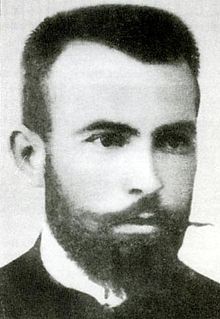 Portrait of Krste P. Misirkov | |
| Pen name | "K.Pelski" |
| Occupation | philologist, slavist, historian, ethnographer, publicist, translator and professor. |
| Education | Doctor's degree of philology and history |
| Alma mater | Faculty of philology and history at the University of Petrograd |
| Genre | history, linguistics, philology, politics, ethnography and analytic. |
| Subject | Macedonian history, language and ethnicity, Balkan history |
| Literary movement | Macedonian scientific-literary association "St. Clement" |
| Notable works | "On Macedonian Matters", the magazine "Vardar", over 30 articles published in different newspapers. |
| Spouse | Ekaterina Mihajlovna - Misirkova |
| Children | Sergej Misirkov |
| Relatives | Kata Misirkova - Rumenova |
| Signature | |
 | |
Krste Petkov Misirkov ([Кръсте/Кръстю/Кръстьо Петков Мисирков] Error: {{Lang-xx}}: text has italic markup (help); [Крсте Петков Мисирков] Error: {{Lang-xx}}: text has italic markup (help)) (born 18 November 1874 in Postol, Ottoman Empire (today Greece); died 26 July 1926 in Sofia, Kingdom of Bulgaria) was a philologist, slavist, historian, ethnographer, publicist author of the first book and scientific magazine in Macedonian,[1] where he for the first time outlined the principles of the literary Macedonian language.[2][3][4] He was named as the greatest Macedonian of the 20th century.[5]
His writings are central to the issue of the existence of a Macedonian nation distinct from the Bulgarian nation. He published one book, one magazine and over thirty articles. However, at different points in his life, Misirkov expressed conflicting statements about the ethnicity of the Slavic population living in Macedonia, including his own ethnicity, calling them Bulgarians, Macedonians or Macedonian Bulgarians respectively. As a result, both his ethnic attachment and legacy remains a matter of dispute among historians from Bulgaria and Macedonia.
Biography
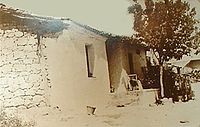

Krste Petkov Misirkov was born on 18 November 1874 in the village of Postol, Ottoman Empire. He started his elementary education in the local Greek school, where he was studying until the sixth grade elementary school, but the bad financial situation of his family could not support his further education at that point and he left the school. At that period Serbian propaganda began to promote its variant of "Macedonism" and to recruit young people in order to "Serbianize" them.[6] After some period without proper education, Misirkov applied and was granted a scholarship by the Serbian association "St. Sava".[7]
Misirkov spent some time in Serbia, where he was studying in Serbian, and soon after he realized that the propaganda was the main goal of the Serbian association.[6] That politics practiced by the association, forced the Misirkov and the other Macedonian students to participate in a students' revolt against the association. As a result of that, Misirkov and other companions moved from Belgrade to Sofia. Since he faced up with similar situation in Bulgaria, i.e. another propaganda[6], Misirkov again went to Serbia to continue his education, but without any success because he was rejected by the "St. Sava" association. Since he was willing to get higher education, he was forced, by a chain of events, to enroll a theological school for teachers. Similar to the association "St. Sava", this school as well had its own propagandistic goals and that resulted in another revolt of the students. As a result of it, the school stopped working and the students were sent throughout Serbia. Misirkov was sent to Šabac, where he finished the last, fourth, class of secondary education, but this time in the local gymnasium.[7] In both, Serbia and Bulgaria, Misirkov and his friend were treated as Serbians or Bulgarians[6][7] in order to be accepted in the educational system. After the gymnasium, even though he graduated, Misirkov enrolled in another secondary school for teachers in Belgrade, where he graduated in 1895. During this time, particularly in 1893, Misirkov founded an association of students called "Vardar". Its charter included, among other things, the aim of studying and spreading a knowledge of their country as regards its geographical, ethnographic and historical aspects and the cardinal principle of its program was that Macedonia should belong to the Macedonians.[6][7] In other words, the students were not satisfied by the Serbianization of the Macedonians.[8] This idea was inspired by the Macedonians in Sophia called "Lozari"[7]. However, the Serbs were opposed to this thesis of the young Macedonians, so their society did not last very long and it was disbanded in 1895.[6] Afterwards he was appointed as a Serbian teacher in Pristina. Misirkov refused and left for Odessa to continue his studies.
His educational qualifications obtained in Belgrade were not recognized in Russia. Misirkov had to study from the very beginning in the Seminary at Poltava. In 1897 he was able to enter the Petersburg University. Misirkov carried out here his first scholarly lecture on the ethnography and history of the Balkan Peninsula before the members of the Russian Imperial Geographical Society. In 1901, he moved to the University of Odessa. Of great importance to Misirkov was the founding of the Macedonian Scientific and Literary Society in Petersburg.[9] Its creation was influenced by the Macedonian Club founded in Belgrade. After the Club was closed, its chief founders left for the Russian capital, where they organized the new Macedonian Society. This foundation in 1902 became the most important Macedonian institution abroad. In the same year this Society sent a special Memorandum to the Great Powers, in which the Macedonian Question was examined from the national point of view. It was proposed also Macedonian literary language to be codified. The question was also examined of establishing a Macedonian Church under the Ohrid Archbishopric. The aim of this Memorandum was that the Macedonians should be recognized as a separate nation and that Macedonia should be granted full autonomy within the Ottoman Empire.

Later Misirkov abandoned the University and left for Ottoman Macedonia. Facing financial obstacles to continue his postgraduate education, he accepted the proposal of the Bulgarian Exarchate to be appointed teacher in a high school in Bitola. There he became friendly with the Russian consul in Bitola. He began to plan opening of local schools and publishing textbooks in Macedonian language. But the Ilinden Uprising in 1903 and the assassination of the Russian Consul changed his plans and he returned to Russia. There Misirkov published different articles about the Ilinden Uprising and the reasons why the Consul was assassinated. Soon afterwards he wrote the book "The Macedonian matters." This book, written in the Macedonian language, was published in Sofia, where he founded a new circle of Macedonian intellectuals. In 1905, he left for Berdiansk in Southern Russia. There he resumed publication of the journal "Vardar" and worked as Bulgarian teacher.[10] In many of his next articles after 1905 Misirkov esposed pro-Bulgarian views and even categorically renounced the point of his book "The Macedonian matters".[11][12][13] When the First Balkan war was declared, Misirkov went to Macedonia as a Russian war correspondent. There he could follow the military operations of the Bulgarian Army. Misirkov published a series of articles in the Russian press and some articles demanding that the Ottomans should be driven out of Macedonia. In 1913, after the outbreak of the Second Balkan war Misirkov went back to Russia, where he worked as a teacher also in the Bulgarian schools in Odessa.[14] Here he wrote his diary, which was found in 2006. Later he was appointed teacher of the Bulgarian school at Kishinev. At that point, Misirkov made contacts with the Macedonian Scientific and Literary Society, which started publishing the magazine "Macedonian Voice" in Russian. Misirkov was publishing in this magazine for some period under the pseudonym "K. Pelski".[7]
After the outbreak of the First World war in 1914 Bessarabia became a republic, and he was elected a member of the local parliament Sfatul Ţării as a representative of the Bulgarian minority. At the same time, Misirkov worked as a secretary in the Bulgarian educational commission in Bessarabia.[14] However, the Parliament was forced to declare the annexation of Bessarabia to Romania in November 1918. Then Misirkov returned to Sofia, where he spent one year as a head of the Historical department of the National Museum of Ethnography. Then, he worked as a teacher and director of the high school in Karlovo. In 1921 Misirkov wrote a letter to the Serbian Ambassador at Sofia asking him to secure his appointment to a teaching post at the grammar school in some Macedonian town, but his application had been rejected. Accordingly, he resumed his journalistic activity and published many articles on the Macedonian Question in the Bulgarian press. In 1925 he was removed to work as director of the high school in Koprivshtitsa, but soon after he fell ill. Misirkov died in a hospital in Sofia in 1926.[14][10] He was buried in the graveyards in Sofia with the financial support of 5000 levs from the Ministry of Education, as an honoured educator.[15]
Works
In his life, Misirkov wrote one book, one diary, published one issue of a magazine and wrote more than thirty articles. His most important work is the book "On Macedonian Matters", published in Sofia in 1903. The magazine was called "Vardar" and was published in 1905 in Odessa, Russian Empire. The articles that Misirkov wrote have been published in different newspapers and they were focused on different topics.
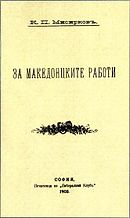
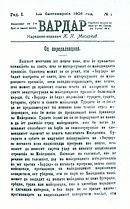
"On the Macedonian Matters"
Misirkov's most important writing is undoubtedly the book Za makedonckite raboti (On Macedonian Matters) published in 1903 in Sofia, in which he laid down the principles of the modern Macedonian language. According to this book, the Macedonian language should be based on dialects from the central part of Macedonia which are the Veles, Prilep, Bitola and Ohrid dialects. He also used those dialects in the book itself. Most copies of the book were confiscated and destroyed by the Bulgarian police, shortly after the book was published.[4] Misirkov's principles played a crucial role in the future codification of the Macedonian language, right after World War II.
The magazine "Vardar"
Besides "On Macedonian Matters", Misirkov is author of the first scientific magazine on Macedonian language. The magazine "Vardar" was published in 1905 in Odessa, Russian Empire. The magazine was published only once, because of the financial problems that Misirkov had been facing with at that time. "Vardar" has been published on Macedonian language, and the orthography that has been used is almost same as the orthography of the standard Macedonian language[16].
Articles
During his life, Misirkov published more than 30 articles for different newspapers and magazines. Most of his articles deal with Macedonia, Macedonian culture, ethnology, politics and nation. However, there are also some articles published in Sofia which are in tight connection with the Bulgarian politics at that period of time. Misirkov published his articles in Macedonian, Russian and Bulgarian and he published them either in Russia or in Bulgaria. Most of the articles were signed by his birth name, but there are articles that are signed with his pseudonym K. Pelski.
Diary
In 2006, a handwritten diary by Misirkov written during his stay in Russia in 1913 was discovered. It was declared authentic by Bulgarian and Macedonian experts and was published in 2008.[17] The content of the diary clearly shows that at the time, Misirkov was a Bulgarian nationalist. It has given rise to new public discussion over Misirkov's stances on Bulgarian and Macedonian ethnicity.[18][19]
Contribution to Bulgarian dialectology and ethnography
In several publications Misirkov made attempt to determine the border between Serbo-Croatian and Bulgarian languages, including in the Bulgarian dialect area nearly all of Torlakian and Macedonian dialects.[20] Misirkov pointed there, that the population in Pomoravlje is autochthonous and Bulgarian by origin, excluding any later migrations during the Ottoman rule from Bulgaria.[14] According to Krste Misirkov, Krali Marko epic songs in Serbia, the so called Bugarstici[21] are a result from Bulgarian musical influence over the Serbian folk music.[22]
Controversies about Misirkov's ethnicity and views
During the second half of 19 century and the beginning of the 20 century the idea of a separate Macedonian ethnicity was as yet promoted only by some circles of intellectuals.[23] Then, the most of the Slavic population in Macedonia had a Bulgarian conciousness,[24][25][26][27] and this idea failed to gain wide popular support.[28][29][30] At different points in his life, Misirkov expressed conflicting statements about the ethnicity of the Slavs living in Macedonia, including his own ethnicity.
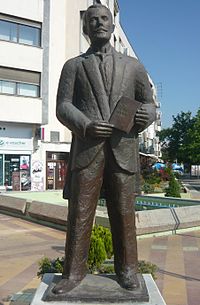
View of Misirkov in Bulgaria
In Bulgaria Misirkov is regarded as a controversial person, who graduated from the Belgrade University as a student of Prof. Stojan Novaković and was influenced by his ideas.[31] At that time Novaković was a prominent proponent of the Macedonism, thereby promoting Serbian interests in the region of Macedonia.[32] However, later Misirkov obvious reject this ideas and Bulgarian historians believe that his writings were significantly altered by the post-WWII Yugoslavian Communist regime to support the notion of a "Macedonian nation", distinct from the Bulgarian nation.[33] Bulgarians also note that Misirkov was Bulgarian deputy in Bessarabia, choose Bulgarian citizenship, lived and died in Bulgaria and worked there until his death in 1926.
View of Misirkov in Macedonia
In Macedonia, Misirkov is regarded as the most prominent Macedonian publicist, philologist and linguist who set the principles of the Macedonian literary language in the early 20th century. In some of his writings he clearly identified the population of Macedonia as belonging to the Slavic populations, expressing the need for "we Slav peoples [...] to unite our own Macedonian Slav population". Also, Misirkov is the author of the first scientific magazine in Macedonian and because of his contributions to the Macedonian national cause, he is regarded as the greatest Macedonian of the 20th century. In his honor, many books and scientific works have beep published and the Institute for Macedonian language "Krste Misirkov" is named after him. Since he was not allowed to live in work in Macedonia by the Yugoslav authorities[34], unwillingly he remained in Bulgaria where he got Bulgarian citizenship since he needed for his job. This is in tight connection with his "Diary", where he named himself as "Macedonian Bulgarian", which means Macedonian with Bulgarian citizenship in political sense.[35] The most quoted and most popular Misirkov's thought in Macedonia is:
We are bound to be loyal to our language because it is ours, just as much as the country in which we live.[36]
Ivo Banac's view of Misirkov
While Misirkov's work and personality remain highly controversial and disputed among historians in Bulgaria and the Republic of Macedonia, there have been attempts among international scholars to reconcile the conflicting and self-contradictory statements made by Misirkov about himself and about the nationality of the Slavs living in Macedonia. According to Croatian Ivo Banac, professor of history at Yale University, "Misirkov viewed both himself and the Slavs of Macedonia as Bulgarians, and espoused pan-Bulgarian patriotism in a larger Balkan context, and especially with regard to Serbian and Greek hegemonism in Macedonia. However, in the context of the larger Bulgarian unit/nation, Misirkov sought both cultural and national differentiation from the Bulgarians and called both himself and the Slavs of Macedonia Macedonians."[37]
Misirkov family
| n/a | n/a | ||||||||||||||||||||||||
| Ekaterina Misirkova | Krste Misirkov | Lazar Misirkov | |||||||||||||||||||||||
| n/a | {{{#}}} | Sergej Misirkov | |||||||||||||||||||||||
| n/a | {{{#}}} | Boris Misirkov | |||||||||||||||||||||||
Footnotes
- ^ Мисирков е еден од најголемите Македонци
- ^ Pluricentric languages: differing norms in different nations, Michael G. Clyne, Walter de Gruyter, 1992, ISBN 3110128551, p. 440.
- ^ South Slavic Discourse Particles Pragmatics and Beyond. New Series, Mirjana N. Dedaić, Mirjana Miskovic-Lukovic, John Benjamins Publishing Company, 2010, ISBN 9027256012, pp. 12-13.
- ^ a b {{cite web|url=http://books.google.com/books?id=ZmesOn_HhfEC&pg=PA67&dq=misirkov+standart+macedonian&hl=bg&ei=PMhCTdiOFo_rOYb82bcB&sa=X&oi=book_result&ct=result&resnum=8&ved=0CEgQ6AEwBw#v=onepage&q&f=false%7Ctitle=The Macedonian Conflict: Ethnic Nationalism in a Transnational World, Loring M. Danforth, Editor: Princeton University Press, 1997, ISBN 0691043566,p. 64.]
- ^ Крсте Петков Мисирков најзначајна македонска личност во 20 век
- ^ a b c d e f "Biography of Krste Petkov Misirkov". Retrieved 6 February 2011.
- ^ a b c d e f Literature of the Macedonian language, Georgi Stalev, Skopje
- ^ Антони Гиза, Балканските държави и македонския въпрос
- ^ Tha Balkan states and the Macedonian question, prof. Antony Giza
- ^ a b Георги Маргаритов. В Скопие продължават да показват само едното лице на Кръсте Мисирков. в-к "Македония", брой 10, 10 март 1999 г.
- ^ Трайков, Веселин (2000). Кръсте Мисирков и за българските работи в Македония. Знание, ISBN 954-621-177-X.
- ^ К. Мисирков. „БЕЛЕЖКИ ПО ЮЖНОСЛАВЯНСКАТА ФИЛОЛОГИЯ И ИСТОРИЯ /КЪМ ВЪПРОСА ЗА ПОГРАНИЧНАТА ЛИНИЯ МЕЖДУ БЪЛГАРСКИЯ И СРЬБСКО-ХЪРВАТСКИЯ ЕЗИЦИ И НАРОДИ/“ Българска сбирка, XVII, януари 1910, кн. 1, с. 39-42; февруари 1910, кн. 2, с. 100; маи 1910, кн. 5, с. 328; г. XVIII, март 1911, кн. 3, с. 197; април 1911. кн. 4, с. 265-267.
- ^ И. Михайлов. ИСТИНСКИЯТ ОБРАЗ НА НЕУРАВНОВЕСЕНИЯ КР. МИСИРКОВ. Избрани произведения. Съставители: Кръстю Гергинов, Цочо Билярски. Военноиздателски комплекс Св. Георги Победоносец, Университетско издателство Св. Климент Охридски, София 1993. Стр. 389-390
- ^ a b c d Трайков, Веселин (2000). Кръсте Мисирков и за българските работи в Македония. Знание. ISBN 954621177Х.
{{cite book}}: Check|isbn=value: invalid character (help) - ^ ЦДИА, фонд № 177, Министерство на просвещението, опис № 2, а.е.230, л.22.
- ^ p.13, "Vardar", Blaže Ristovski, Institute of Macedonian language "Krste Misirkov", Skopje, 1966.
- ^ FOCUS Information Agency
- ^ Нетинфо - Как "бащата на македонизма" Кръстьо Мисирков се оказа чист българин
- ^ Diary Reveals Father of Macedonian Nation Had Bulgarian Identity, Sofia News Agency, 23 April 2008, Wednesday
- ^ See: Мисирков, Кръстьо (1898). Значението на моравското или ресавското наречие за съвременната и историческа етнография на Балканския полуостров. Български преглед, година V, книга І, стр. 121-127; Мисирков, Кръстьо (1910, 1911). Бележки по южно-славянска филология и история (Към въпроса за пограничната линия между българския и сръбско-хърватски езици и народи), Одеса, 30.XII.1909 г. Българска сбирка.
- ^ The Bugarstica: A Bilingual Anthology of the Earliest Extant South Slavic Folk Narrative Song (Illinois Medieval Studies) John S. Miletich, ISBN 0252017110, University of Illinois Press.
- ^ К. Мисирков. Южнославянските епически сказания за женитбата на крал Марко сред южните славяни. Одеса, 1909. с. 6.; К. Мисирков. Народният ни епос и Македония. - Развитие, II, кн. 2-3, февруари-март 1919, с. 80.; К. Мисирков. Крали Марко. - Илинден, III, бр. 12, 25 март 1923.
- ^ The Macedonian Question: Britain and the Southern Balkans 1939-1949, Dimitris Livanios, Oxford University Press US, 2008 ISBN 0199237689, p. 15.
- ^ Center for Documentation and Information on Minorities in Europe, Southeast Europe (CEDIME-SE) - "Macedonians of Bulgaria".
- ^ 154 Studia Theologica V, 3/2007, 147 - 176 Alexander Maxwell, Krste Misirkov's call for Macedonian Autocephaly: religious nationalism as instrumental political tactic.
- ^ Krste Misirkov, On the Macedonian Matters (Za Makedonckite Raboti), Sofia, 1903: "And, anyway, what sort of new Macedonian nation can this be when we and our fathers and grandfathers and great-grandfathers have always been called Bulgarians?"
- ^ Sperling, James; Kay, Sean; Papacosma, S. Victor (2003). Limiting institutions?: the challenge of Eurasian security governance. Manchester, UK: Manchester University Press. p. 57. ISBN 978-0-7190-6605-4.
Macedonian nationalism Is a new phenomenon. In the early twentieth century, there was no separate Slavic Macedonian identity
- ^ The Macedonian Conflict: Ethnic Nationalism in a Transnational World, Loring M. Danforth, Editor: Princeton University Press, 1997, ISBN 0691043566,p. 64.
- ^ Rae, Heather (2002). State identities and the homogenisation of peoples. Cambridge: Cambridge University Press. p. 278. ISBN 0-521-79708-X.
Despite the recent development of Macedonian identity, as Loring Danforth notes, it is no more or less artificial than any other identity. It merely has a more recent ethnogenesis - one that can therefore more easily be traced through the recent historical record.
- ^ Zielonka, Jan; Pravda, Alex (2001). Democratic consolidation in Eastern Europe. Oxford: Oxford University Press. p. 422. ISBN 978-0-19-924409-6.
Unlike the Slovene and Croatian identities, which existed independently for a long period before the emergence of SFRY Macedonian identity and language were themselves a product federal Yugoslavia, and took shape only after 1944.
- ^ Църнушанов, Коста. Македонизмът и съпротивата на Македония срещу него. Унив. изд. "Св. Климент Охридски", София, 1992.
- ^ "Since the Bulgarian idea, as it is well-known, is deeply rooted in Macedonia, I think it is almost impossible to shake it completely by opposing it merely with the Serbian idea. This idea, we fear, would be incapable, as opposition pure and simple, of suppressing the Bulgarian idea. That is why the Serbian idea will need an ally that could stand in direct opposition to Bulgarianism and would contain in itself the elements which could attract the people and their feelings and thus sever them from Bulgarianism. This ally I see in Macedonism...." from the report of S. Novakovic to the Minister of Education in Belgrade about "Macedonism" as a transitional stage in Serbianization of the Macedonian Bulgarians; see idem. Cultural and Public Relations of the Macedonians with Serbia in the XIXth c.), Skopje, 1960, p. 178.
- ^
"Истинският образ на неуравновесения Кръсте Мисирков - Иван Михайлов, 1969 [[:Template:Bg icon]]". Retrieved 2009-07-16.
{{cite web}}: URL–wikilink conflict (help) - ^ Misirkov's application for permanent residence in Macedonia.
- ^ Експерти: Нема дилеми за идентитет на Мисирков on a1.com.mk
- ^ Misirkov, K. Few words about the Macedonian literary language, On the Macedonian matters, Sogia, 1903, p. 135
- ^ Ivo Banac: The National Question in Yugoslavia. Origins, History, Politics. Cornell University Press, 1984
External links
- Works
- Krste Misirkov - Misirkov's work on the Macedonian Wikisource. Complete text of his book, magazine and articles.
- Magazine "Vardar" on Wikisource. Template:Mk icon
- "On Macedonian matters" - complete text on Wikisource. Template:Mk icon
- "On Macedonian matters" - scan of the original book. Template:Mk icon
- "On Macedonian Matters" - complete text. Template:Mk icon
- Project: Krste Misirkov - on line interactive site about Misirkov's life and work. Template:Mk icon
- "On Macedonian Matters" - complete text. Template:En icon
- Misirkov's diary - downloadable link. Template:Mk icon
- General
